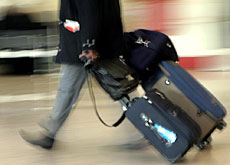Canada to get access to Swiss flight data

Swiss airlines flying to Canada will have to hand over passenger data to the Canadian authorities – the second deal of this kind after the United States.
The move comes after Switzerland and Canada signed a memorandum of understanding on the transfer of passenger information on Friday.
According to a Swiss Federal Civil Aviation Office statement, the agreement covers 25 types of information, including a person’s name, nationality, passport number and travel ticket data.
Left out are “sensitive” details such as religious or political beliefs, medical information and dietary preferences, it said.
Canadian authorities have been demanding access to passenger data on Swiss airlines as part of measures to fight terrorism.
It follows on from similar precautions taken by the US after the September 11, 2001 terrorist attacks within its borders.
Switzerland approved a passenger data accord with the US last year, which covers 34 types of information, including address and e-mail details.
The aviation office said it was satisfied that the Canadian agreement was compatible with Swiss data protection rules. A similar arrangement is already in place between Canada and the European Union, it added.
Terrorism and crime
The memorandum, which will at first be limited to three-and-half years, will guarantee that the data will only be used in the fight against terrorism and international crime.
According to the Canada Border Services Agency, the data is to help identify “persons who may be subject to closer questioning or examination on arrival in Canada because of their potential relationship to terrorism, or terrorism-related crimes, or other serious crimes such as the smuggling of drugs and humans”.
Under the terms of the deal, which will come into force immediately, both countries will be able to check if the accord is being respected and applied correctly.
Passengers will also be allowed to see and demand corrections to the information that has been gathered on them. This will be stored in Canada for three-and-a half years.
Furthermore, the Canadian authorities – like those in the US – will not have direct access to airlines’ databases, added the statement.
The US agreement seems to have started off smoothly. According to the Swiss Federal Data Protection Commission, no complaints have been received, although a spokesman said that a full assessment of its effects had yet to be carried out.
swissinfo with agencies
The United States started to collect passenger data as part of anti-terrorism measures following the September, 11 2001 terrorist attacks.
It signed an accord with the European Union on the subject in May 2004. A similar deal followed with Switzerland in March 2005.
Canada also decided to collect passenger data after the attacks. It signed an agreement with the EU last October.
The Swiss-Canadian accord was signed by the Raymond Cron, head of the Swiss Federal Civil Aviation Office and Alain Jolicoeur, president of the Canada Border Services Agency, in the Swiss capital, Bern, on Friday.

In compliance with the JTI standards
More: SWI swissinfo.ch certified by the Journalism Trust Initiative










You can find an overview of ongoing debates with our journalists here . Please join us!
If you want to start a conversation about a topic raised in this article or want to report factual errors, email us at english@swissinfo.ch.